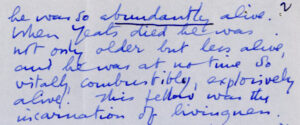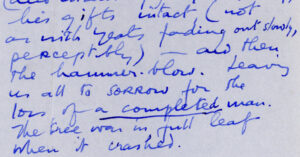Frank O’Connor: “the incarnation of livingness”
- Emer Twomey
- March 9, 2016
On the 10th March 1966 the death occurred of the Cork-born writer Frank O’Connor at the age of 62 in Dublin. He was best known for his short stories and memoirs. 2016 marks the 50th anniversary of his passing.
His death came as a shock to both family and close friends. One such friend was the Cork-born writer Seán O’Faolain. In a letter to their mutual friend John V. Kelleher (from the collection held in UCC Library Correspondence with Frank O’Connor & Seán O’Faolain) O’Faolain writes how much Michael’s death has affected him and reflects on the man (Frank O’Connor’s real name was Michael O’Donovan). The following is a partial transcription of the letter written on 14 March 1966 in Killiney, Co. Dublin, where O’Faolain lived.
My dear John,
Well, this is theoretically all over. A sudden death blesses those who receive it and blasts those who bury them. If you have been feeling the same sense of blackness, blankness and emptiness I have, I have just about enough feeling left in me to be sorry for you with the kind of miserable sorrow relatives of the dead dully feel for one another – no more. And I think you like me feel more – regrets, the “too-late” guilt, remorse, and an unappeasable anger with certain among the living, more among the dead, and last of all and most of all with whoever made us and kills us.
It is not his genius I miss. That’s in his books. It is not even the man – we had both lost him before now. I hate the simple fact of his not being alive; not solely but mainly because while he lived he was so abundantly alive. When Yeats died he was not only older but less alive, and he was at no time so vitally, combustibly {sic}, explosively alive. This fellow was the incarnation of livingness.
His genius depended on it. It was a flame. No alloy. No coldness of the intelligence to make it a blend with some other form of apprehension. Pure undiluted intuition. A rare marvel. Of course, death always telescopes and simplifies a man. We think of him only as his essence. You and I know his many many hours & days of near-lunacy from depression, boredom, fury, frustration: as we know too how his essential sensitivity and sensibility would leak away into their opposites – even into cruelty and brutality and blind insensitivit {sic}. It had to be that way. He just had to be what he was – a receptacle for every emotional storm, as for every least gentle and tender whisper of the softest wind of feeling, of the mystery and the poetry of life.
Such men make their death our death. They fill life. With life and death. It is all about me these days – this sense of waste. Whence my obscene rage – so futile, so frustrating, so unmanning.
It is rounded off. The turbulent life, the mellowing – that did not decline into apathy, capable of fine indignation to the last – the big public success always, the return to Ireland, the happy years with Harriet, not declining into mere dull domestic habit, the grand old man admired still (and intensely) by the young, his gifts intact (not as with Yeats fading out slowly, perceptibly) – and then the hammer blow. Leaving us all to sorrow for the loss of a completed man. The tree was in full leaf when it crashed.
My deep sympathy with you, dear John, in this total loss.
Ever
Seán
It is clear from John V. Kelleher’s reply to O’Faolain that the friendship between Kelleher and O’Connor had had its ups and downs but he writes;
“Ah. God. We’ll not meet his like again. And I suppose the real tragedy is that if by some miracle we did, we’d shy off, missing out on the best for fear of re-encountering the worst. Except for what you learn about yourself a man like that teaches you almost nothing about human nature that you can use. He’s too special, unique. But by Christ, I’m glad I knew him. There are radii in every direction that he lengthened far beyond my means.” (BL/L/JVK/104)
On 10th March 2016 to mark the 50th anniversary of Frank O’Connor’s death, UCC School of English, with the support of the Irish Research Council, has organised “Frank O’Connor: A Real Story” to celebrate O’Connor’s legacy.
UCC Library, via Special Collections, holds the Frank O’Connor Collection, the personal library of O’Connor, its contents reflecting the man’s interests. We also have the Frank O’Connor Bibliographic Collection, a definitive collection of the works of O’Connor, featuring many of his first editions with subsequent editions and overseas publications and translations.
Archival collections relating to Frank O’Connor can be accessed via UCC Library Archives Service and these include:
- Correspondence with Frank O’Connor & Seán O’Faolain
- Frank O’Connor (Agents)
- Ruth Sherry: Index Cards (Frank O’Connor Bibliography)
- The Nancy McCarthy Collection
- The Papers of Daniel Corkery
I’ll finish with the thoughts of O’Connor during his time teaching at Northwestern University, Illinois, USA
“Anglo-Irish is a different subject, and it’s no use pretending I can teach it, though I do my best. The trouble is, John, it’s all Yeats, whatever you say; Joyce only slinks in as a negation of Yeats – Yeats as he might have been if he’d only had talent and no brains, no character and no decency. I am beginning to feel a respect for Sean and myself…we are, like Paul and the apostles, poor devils who do the best we can to make intelligible the preposterous ideas of that Sligo Christ, adapting them to history and Cork.” (BL/JVK/179)
Acknowledgements:
Information relating to the Frank O’Connor libraries supplied by Elaine Harrington (Special Collections Librarian, UCC Library)



